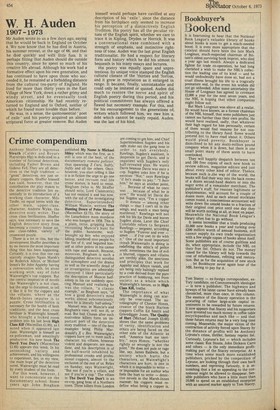Bookbuyer's
Bookend
It is heartening to hear that the National Book League's valuable library of books about books is soon to get a much-needed boost. It is even more appropriate that the catalyst should have been the late Mark Longman, much-respected chairman of Bri tain's oldest surviving book imprint, who died a year ago last month. Always a dedicated fighter for trade co-operation, he had long cherished a wish to make the NBL's collec tion the leading one of its kind — and he would undoubtedly have done so, had not a cruel illness brought his life to a tragically premature end. In the event his wishes did not go unheeded. After some uncertainty the House of Longman has agreed to covenant £2,000 a year for the next seven years, and the NBL is hoping that other companies might follow suit.
But Mark Longman was above all a realist. He would have known, as a former chairman of the NBL himself, that some publishers just cannot see further than their own profits. He would have realised, sadly, that whatever their high regard for him personally, certain of them would find reasons for not contributing to the library fund. Some would pretend not to have read about it. Others would plead poverty. Bookbuyer is disinclined to hit any multi-million pound company when it is down, but there is one small point many of them seem to have overlooked.
They will happily despatch between ten and 100 free copies of each new book to review editors, magazine editors and just about every other kind of editor. Thence, because such is .the way of the world, the books will find their way into the back rooms of a dozen second-hand dealers or into the eager arms of a remainder merchant. The publisher's staff, for reasons legitimate or kleptomaniac, will account for a couple of dozen more. And as each annual stocktake comes round, a conscientious accountant will write down the unsold books to a fraction of their original cost price until one day they will be worth nothing at all, at least on paper. Meanwhile the National Book. Le'ague's library often has to go without.
It seems incredible that a trade producing 33,000 new books a year and turning over £200 million worth of annual business, still cannot supply its own trade organisation with a few single copies of books about itself. Some publishers are of course guiltless and do, when appropriate, include the NBL on their free list. Others do not. The money raised for the library will help towards the cost of refurbishment, refitting and restora tion. But as for the acquisition of new stock . . . let Bookbuyer never again hear of the NBL having to pay for it.
Tom Stacey — ex-foreign correspondent, exTory candidate, ex-Commonwealth ideologist — is now a publisher. The highways and byways of his latest career have already been chronicled, more than once, in this column. The essence of the Stacey operation is the procuring of rather large-scale capital investments to be rewarded by future returns. It now appears that Stacey and his supporters have invested too much money in coffee table encyclopaediae and such like — and that those future returns may be a very long time coming. Meanwhile, the major victim of the contraction of activity forced upon Stacey by the distance of profits will be Anthony Lejeune's crime, thriller, fantasy reprint list. Curiously, Lejeune's list — which includes some classic Rex Stouts, John Dickson Carrs and others — is the only immediate profitmaking part of the Stacey enterprise. At a time when some much more established publishers, pricked by the competition of Lejeune, are looking through their own back numbers, and reprinting furiously, it is astonishing that a list so appealing to the connoisseur might be allowed to disappear. Sensible publishers who have a little more than 10,000 to spend on an established enterprise with an assured market apply to Tom Stacey.


































 Previous page
Previous page